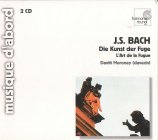This disc offers a nicely engineered Art of Fugue with cogent and skilled playing from Davitt Moroney, culminating with his own conjectural realization of the last fugue, No. 14. The instrument used here was constructed in 1980 by John Phillips, after originals by Ruckers, Blanchet, and Taskin. The recording, made in 1995 at the Salle Adyar, Paris, is bright, clear, and not too closely miked, providing a high level of immediacy without too many intrusive noises from the keyboard mechanism. Moroney follows a traditional ordering of 14 fugues and four canons, enabling the listener to follow the increasingly complex ramifications without losing sight of the vast intellectual sweep this work embodies.
Moroney’s account gains further value from his completion of the last fugue, which remained unfinished at Bach’s death. The recording hasn’t the pin-sharp focus of Kenneth Gilbert’s DG Archiv performance, but there’s a useful essay on The Art of Fugue by Moroney himself that should help if, like many a newcomer, you’re finding this work unfathomable. Still, this isn’t exactly Bach for the faint-hearted, so be prepared to listen attentively and often if you want to get the most out of this recording.
































